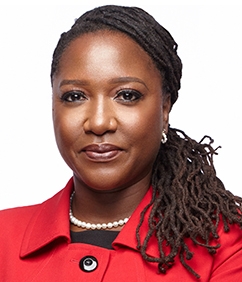NAACP LDF’s Janai Nelson assesses the Supreme Court’s approach to civil rights
Janai Nelson, president and director-counsel of the NAACP Legal Defense Fund (LDF), joined Kenji Yoshino, Chief Justice Earl Warren Professor of Constitutional Law, for a virtual event on September 12 to discuss the current US Supreme Court and the civil rights cases brought before it.
The conversation between Nelson, who succeeded Sherrilyn Ifill ’87 as head of the LDF last year, and Yoshino, faculty director of NYU Law’s Meltzer Center for Diversity, Inclusion, and Belonging, kicked off the center’s annual speaker series for the 2023–24 academic year. Their wide-ranging exchange touched on topics such as how a conservative supermajority on the Supreme Court has altered the civil rights landscape; the immediate effects of Students for Fair Admissions v. Harvard, in which the Court struck down race-conscious college admissions policies; and a potential way forward for American democracy.
“I think the Court has really done a significant disservice to the civil rights landscape,” said Nelson, contrasting the jurisprudence of the current Court with a past body of opinions through which, over the course of decades, the Court had been expanding civil rights protections, however unevenly. In the period before the Court’s current supermajority, she added, “you could not guarantee a win, but there was at least a general feeling that you could tailor arguments that would be heard, would be considered fairly and objectively, by at least a center of the Court. I think now what has happened is the civil rights landscape, which was already a bit chilled, is now almost frozen in terms of the fear that many litigants have about what will happen to our civil rights laws if they go before this Court.”
Regarding Students for Fair Admissions v. Harvard, Nelson said that “the majority [in the opinion] is rejecting the idea that we will assume that someone, because of their race, has necessarily been impacted by it in their lived experience. That is wholly divorced from the reality of nearly every person in this country.” But she also pointed out that the opinion leaves applicants free to describe how racial identity and ethnic background have had a personal impact on them, which admissions officers can then consider.
For Nelson, the current crisis in American democracy stems from “a lack of vision and ability to recognize the evolution of who we are as a nation…. We’re not in any way suggesting that people who aren’t capable, who aren’t qualified, should somehow supplant people who are. What we’re saying is—if we’re being honest with ourselves—opportunity is not equally distributed in this country…. We need to create the opportunities to rebalance the way people are able to access power and position in the workplace and in the university setting and in every sphere of our society.”
Acknowledging a minority of Americans whom she sees as fearful of that rebalancing, Nelson asserted, “If history tells us anything, it is that when people of color and other marginalized people have gained power and gained access and gained rights, they did nothing to take away from power, access, and rights of others. In fact, it just made our entire democracy and our entire citizenry more empowered and more able to exercise [their] rights.”
Posted September 25, 2023


